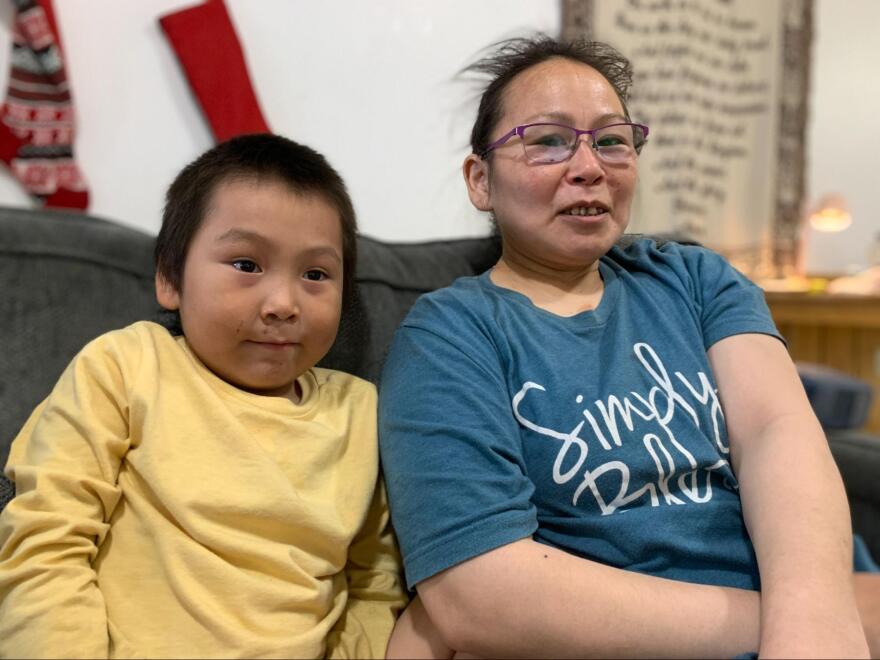There’s a house in the heart of Hooper Bay that’s clearly out of place. It’s sitting along the edge of one of the community’s main roads, pushed up against a power pole. All of the windows are boarded up.
In 2022, the storm surge from the remnants of Typhoon Merbok ripped this house from its foundation, spun it around, and pressed it up against the power pole, the only thing that held it in place. When the flood waters receded, a family of 10 that used to live here was permanently displaced.
Stosh Hoffman, chief programs officer for the Alaska Village Council Presidents Regional Housing Authority (AVCP RHA), said that two families had no place to go after the storm.
“After things settled down, we started getting some phone calls. And people are reaching out for available housing,” Hoffman said.
Hoffman’s organization manages a complex of low income apartments in Hooper Bay in partnership with Cook Inlet Housing Authority. When Hoffman started getting those calls, he checked in with his partners to see if they could help.
“To my surprise, they said, ‘Sorry, but we're not able to do that. It's not the way we run the programs,'” Hoffman said.
He said that the Cook Inlet Housing Authority told him that federal regulations limit how flexible they can be to provide housing.
“And we said, ‘Well, we really need to work around this right now. We got to figure out something at least temporarily.' And so they got back to us. And we said okay, let's move ‘em in for one year, and give them a year to figure out where they can go from there,” Hoffman said.
That year ran out on Oct. 31, 2023. And the families who needed help said that they knew they were going to have trouble finding other places to live because Hooper Bay’s housing market is extremely limited.

Lois Joe and her eight children, ranging in age from one to 18, used to live in the house that is now leaning against the power pole.
Back in September 2023, she said that the looming move-out deadline was a serious point of stress for her family.
“Well lately it’s been hard because I only work three times a week,” Joe said. “My check all goes mainly to food, and I can't even pay any bills or anything.”
Her husband, Martin Joe, wasn't sure where they’d move their whole family either. “I really don't know. It's kind of hard. I mean, thinking about [our kids] and trying to ask for a stay at another house, but it's a lot smaller. It's going to be real crowded in a lot smaller house,” he said.

Loretta Smith was also displaced permanently from her home after last fall’s storm. She and her five-year old son moved temporarily into the apartment right next door to the Joes.
According to a letter she received from FEMA a month after Typhoon Merbok destroyed the house she used to live in, the federal agency “expects all households who receive Rental Assistance to return to their pre-disaster home as soon as it is repaired, or establish long-term housing as soon as possible."
But that didn’t happen for Smith. She didn’t own the home that was destroyed during the storm, so FEMA didn’t pay to fix it. And finding long-term housing in the community has been challenging. She became so frustrated with the back-and-forth that she said that she eventually ripped up the letters FEMA sent her.
“Yeah, I was like, 'I'm done. I'm done dealing with FEMA.' I was like ‘They're done with us too. They're not going to help me,’” Smith said.
An agency spokesperson wrote in an email that “FEMA is aware of the situation” and “any individual who still has unmet needs due to Merbok should contact FEMA’s Alaska Hotline.”
The spokesperson added that “if there are unmet needs beyond what FEMA can provide, the call center staff may make a referral to volunteer organizations” that serve Alaska.
According to FEMA policy, rental assistance provided by that agency is available to applicants for up to 18 months.
But other federal regulations around low income housing programs have also made this situation difficult. The rules that were waived to allow both families to get emergency shelter after Merbok only lasted a year. And AVCP RHA and its partners say that they don’t have the flexibility to extend that because of stringent Internal Revenue Service regulations around who qualifies for low-income housing.
“At this time we are trying to find alternative housing, but we are going to have to move forward with moving the families out only because of those guidelines,” said AVCP RHA President and CEO Peter Evon. He said that the situation highlights a broader and region-wide housing shortage across the Yukon-Kuskokwim Delta.
“But also we have a waiting list as well of families looking to move in, in that community, who are also facing the housing shortage that, unfortunately, every community in our region does,” Evon said.
KYUK first reported on the families’ lack of options in September 2023. Since then, Rural Alaska Community Action Program (RurAL CAP), a statewide nonprofit organization, has also tried to help. But that organization hasn’t been able to find a permanent solution either.
Both families have since moved. Smith is now living in a house that belongs to her extended family. It was also damaged by Typhoon Merbok and has seen minimal repair.
Martin and Lois Joe have moved into a house with family. Martin Joe says that it’s as crowded as ever.
This reporting was supported by a grant from the Center for Rural Strategies and Grist.



